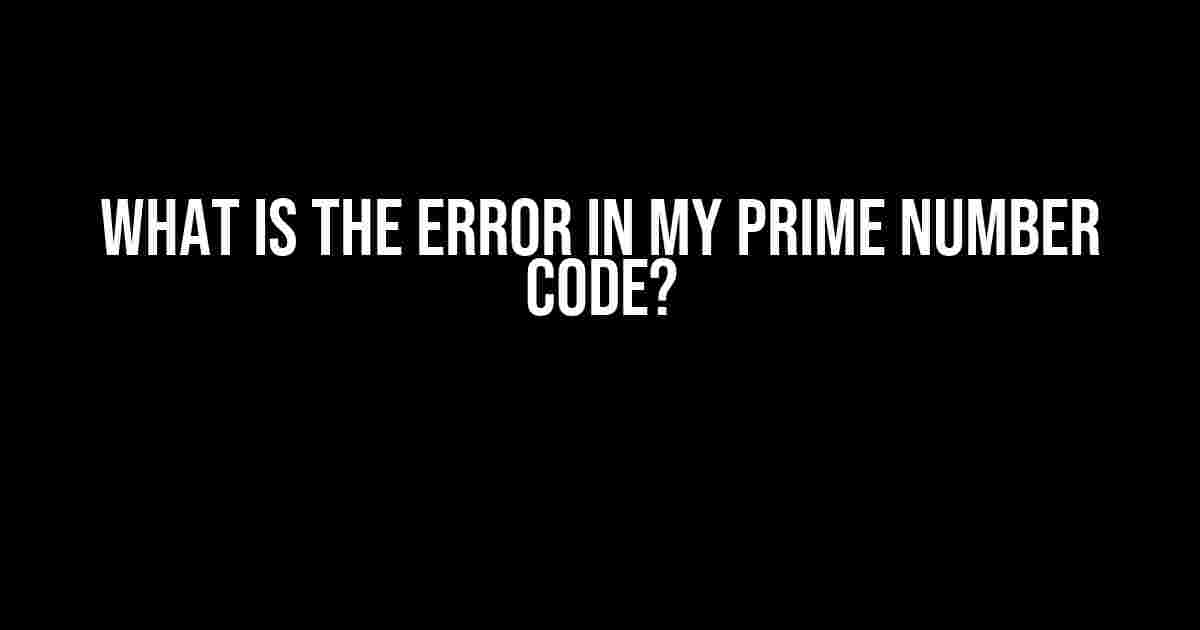Are you struggling to find the error in your Prime number code? Don’t worry, you’re not alone! Many developers have been in your shoes before. In this article, we’ll go through a comprehensive guide to help you identify and fix the error in your Prime number code.
Understanding Prime Numbers
Before we dive into the code, let’s first understand what Prime numbers are. A Prime number is a positive integer that is divisible only by itself and 1. For example, 2, 3, 5, and 7 are all Prime numbers.
How to Check if a Number is Prime
To check if a number is Prime, you need to find out if it has any divisors other than 1 and itself. Here’s a simple algorithm to do so:
- Take an integer n as input
- If n is less than 2, it’s not a Prime number
- Check if n has any divisors between 2 and sqrt(n)
- If it does, it’s not a Prime number
- If it doesn’t, it’s a Prime number
Common Errors in Prime Number Code
Now that we understand Prime numbers, let’s look at some common errors that can occur in Prime number code:
- Incorrect loop boundary: Make sure your loop only goes up to sqrt(n) and not beyond.
- Forgotten special cases: Don’t forget to handle special cases like 1 and 2, which are not Prime numbers.
- Inefficient algorithm: Using an inefficient algorithm can lead to performance issues and incorrect results.
- Off-by-one error: Be careful with array indices and loop counters to avoid off-by-one errors.
Identifying the Error in Your Code
Now that we’ve covered common errors, let’s look at how to identify the error in your code:
- Read your code carefully: Go through your code line by line and make sure you understand what each line does.
- Use print statements or a debugger: Add print statements or use a debugger to see what values your variables are taking during execution.
- Test edge cases: Test your code with edge cases like 1, 2, and large numbers.
- Compare with a working implementation: Compare your code with a working implementation to see where it’s going wrong.
Frequently Made Mistakes
Here are some frequently made mistakes in Prime number code:
| Mistake | Corrected Code |
|---|---|
| Incorrect loop boundary | for (int i = 2; i * i <= n; i++) |
| Forgotten special cases | if (n == 1) return false; // 1 is not a Prime number |
| Inefficient algorithm | bool isPrime = true; for (int i = 2; i * i <= n; i++) { ... } |
| Off-by-one error | for (int i = 0; i < primes.length; i++) { ... } |
Example Code
Here's an example of correct Prime number code in Java:
public class PrimeNumber {
public static boolean isPrime(int n) {
if (n == 1) return false; // 1 is not a Prime number
for (int i = 2; i * i <= n; i++) {
if (n % i == 0) return false; // if n is divisible by i, it's not a Prime number
}
return true; // if n is not divisible by any i, it's a Prime number
}
public static void main(String[] args) {
int num = 25;
if (isPrime(num)) {
System.out.println(num + " is a Prime number");
} else {
System.out.println(num + " is not a Prime number");
}
}
}
Conclusion
Identifying the error in your Prime number code can be a challenging task, but with the right approach, you can do it! Remember to read your code carefully, use print statements or a debugger, test edge cases, and compare with a working implementation. Also, make sure to avoid common errors like incorrect loop boundaries, forgotten special cases, inefficient algorithms, and off-by-one errors. With this guide, you should be able to identify and fix the error in your Prime number code.
Remember, practice makes perfect! Try implementing Prime number code in different programming languages and see how you can optimize it for better performance.
Still having trouble? Feel free to ask in the comments below, and we'll be happy to help you out!
Frequently Asked Question
Get answers to the most common errors in your Prime number code!
Why is my prime number code always returning 1 as a prime number?
This is because you're not handling the case where the input number is 1 correctly. 1 is not a prime number, so you should return false or a similar indicator in your code. Make sure to add a condition to handle this special case!
Why is my prime number code taking forever to run?
This might be due to inefficient algorithms or redundant checks in your code. Try optimizing your code by reducing the number of iterations or using more efficient primality tests, such as the Miller-Rabin primality test. Also, consider adding a timeout or limit to prevent infinite loops!
Why is my prime number code returning incorrect results for large numbers?
This could be due to integer overflow or underflow issues. Make sure to use data types that can handle large numbers, such as long or BigInteger, depending on the language you're using. Also, be cautious of any integer divisions or modulus operations that might cause issues!
Why is my prime number code not working for negative numbers?
Prime numbers, by definition, are positive integers. So, you shouldn't be expecting your code to work for negative numbers. Instead, add a simple check to return an error or a specific indicator for negative inputs!
Why is my prime number code not working for non-integer inputs?
Prime numbers are, by definition, integer numbers. So, your code should only work with integer inputs. Add a check to ensure the input is an integer, and return an error or a specific indicator for non-integer inputs!
